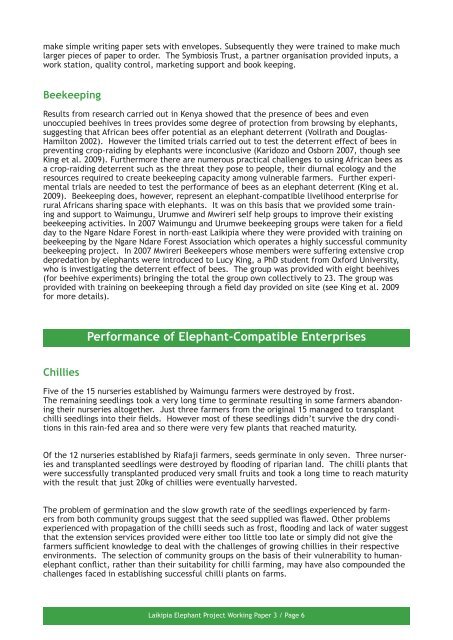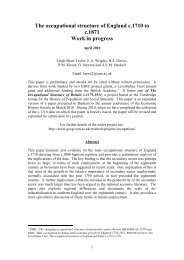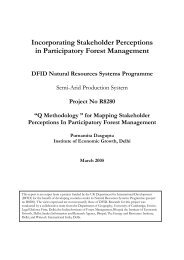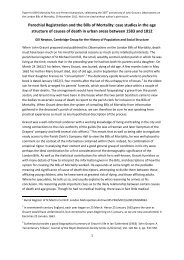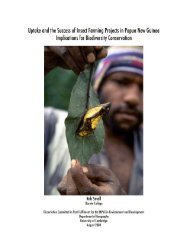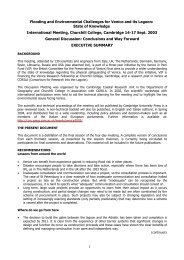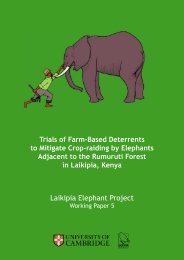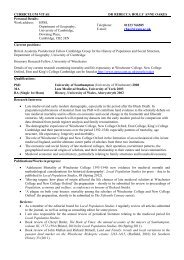An Assessment of Elephant-Compatible Livelihoods - University of ...
An Assessment of Elephant-Compatible Livelihoods - University of ...
An Assessment of Elephant-Compatible Livelihoods - University of ...
Create successful ePaper yourself
Turn your PDF publications into a flip-book with our unique Google optimized e-Paper software.
make simple writing paper sets with envelopes. Subsequently they were trained to make much<br />
larger pieces <strong>of</strong> paper to order. The Symbiosis Trust, a partner organisation provided inputs, a<br />
work station, quality control, marketing support and book keeping.<br />
Beekeeping<br />
Results from research carried out in Kenya showed that the presence <strong>of</strong> bees and even<br />
unoccupied beehives in trees provides some degree <strong>of</strong> protection from browsing by elephants,<br />
suggesting that African bees <strong>of</strong>fer potential as an elephant deterrent (Vollrath and Douglas-<br />
Hamilton 2002). However the limited trials carried out to test the deterrent effect <strong>of</strong> bees in<br />
preventing crop-raiding by elephants were inconclusive (Karidozo and Osborn 2007, though see<br />
King et al. 2009). Furthermore there are numerous practical challenges to using African bees as<br />
a crop-raiding deterrent such as the threat they pose to people, their diurnal ecology and the<br />
resources required to create beekeeping capacity among vulnerable farmers. Further experimental<br />
trials are needed to test the performance <strong>of</strong> bees as an elephant deterrent (King et al.<br />
2009). Beekeeping does, however, represent an elephant-compatible livelihood enterprise for<br />
rural Africans sharing space with elephants. It was on this basis that we provided some training<br />
and support to Waimungu, Urumwe and Mwireri self help groups to improve their existing<br />
beekeeping activities. In 2007 Waimungu and Urumwe beekeeping groups were taken for a field<br />
day to the Ngare Ndare Forest in north-east Laikipia where they were provided with training on<br />
beekeeping by the Ngare Ndare Forest Association which operates a highly successful community<br />
beekeeping project. In 2007 Mwireri Beekeepers whose members were suffering extensive crop<br />
depredation by elephants were introduced to Lucy King, a PhD student from Oxford <strong>University</strong>,<br />
who is investigating the deterrent effect <strong>of</strong> bees. The group was provided with eight beehives<br />
(for beehive experiments) bringing the total the group own collectively to 23. The group was<br />
provided with training on beekeeping through a field day provided on site (see King et al. 2009<br />
for more details).<br />
Performance <strong>of</strong> <strong>Elephant</strong>-<strong>Compatible</strong> Enterprises<br />
Chillies<br />
Five <strong>of</strong> the 15 nurseries established by Waimungu farmers were destroyed by frost.<br />
The remaining seedlings took a very long time to germinate resulting in some farmers abandoning<br />
their nurseries altogether. Just three farmers from the original 15 managed to transplant<br />
chilli seedlings into their fields. However most <strong>of</strong> these seedlings didn’t survive the dry conditions<br />
in this rain-fed area and so there were very few plants that reached maturity.<br />
Of the 12 nurseries established by Riafaji farmers, seeds germinate in only seven. Three nurseries<br />
and transplanted seedlings were destroyed by flooding <strong>of</strong> riparian land. The chilli plants that<br />
were successfully transplanted produced very small fruits and took a long time to reach maturity<br />
with the result that just 20kg <strong>of</strong> chillies were eventually harvested.<br />
The problem <strong>of</strong> germination and the slow growth rate <strong>of</strong> the seedlings experienced by farmers<br />
from both community groups suggest that the seed supplied was flawed. Other problems<br />
experienced with propagation <strong>of</strong> the chilli seeds such as frost, flooding and lack <strong>of</strong> water suggest<br />
that the extension services provided were either too little too late or simply did not give the<br />
farmers sufficient knowledge to deal with the challenges <strong>of</strong> growing chillies in their respective<br />
environments. The selection <strong>of</strong> community groups on the basis <strong>of</strong> their vulnerability to humanelephant<br />
conflict, rather than their suitability for chilli farming, may have also compounded the<br />
challenges faced in establishing successful chilli plants on farms.<br />
Laikipia <strong>Elephant</strong> Project Working Paper 3 / Page 6


